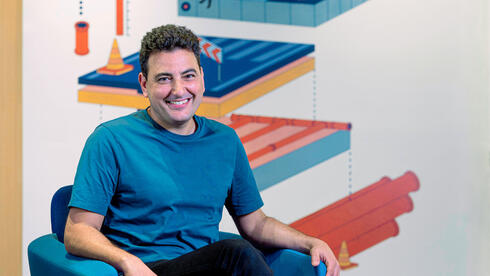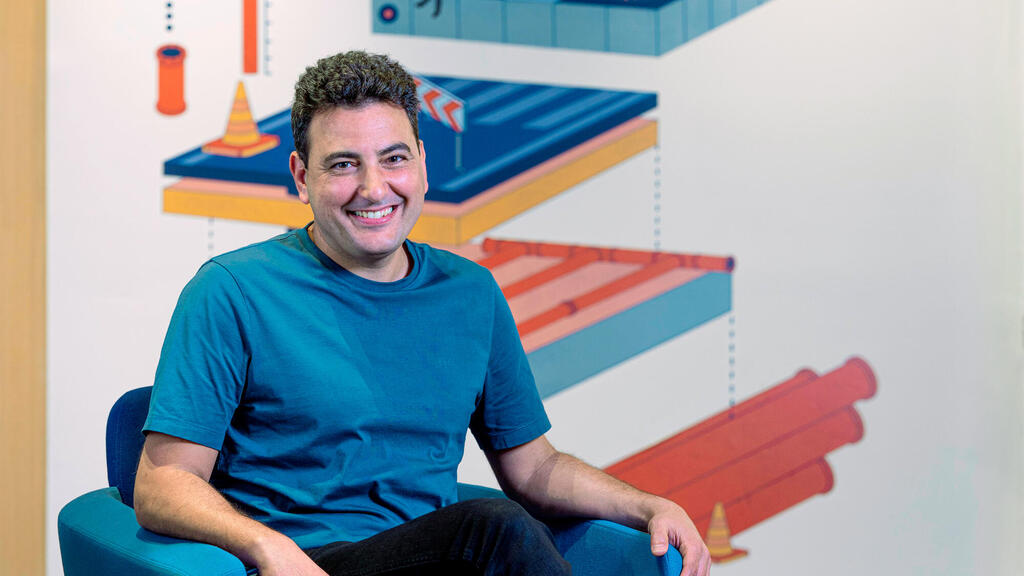
Top 50 Startups List
Locusview: "We take a process that used to take nine months and complete it in 24 hours"
Locusview is not very well known in Israel, but in the US the company's platform helps manage huge infrastructure projects, and synchronizes thousands of workers with incredible efficiency
Locusview, which has received little exposure in Israel, is a small company with big numbers. If the vision of founder Shahar Levi is realized, the large numbers of the field in which it operates will make it a significant player in the hot markets of cleantech and smart cities. The company's platform, designed for the replacement, establishment, and management of energy infrastructures, managed 300,000 projects last year with a total value of $15 billion.
The regulation in the United States strongly encourages the replacement of outdated and polluting energy infrastructures that do not meet modern standards. To encourage the companies to meet new and stricter requirements, the government provides significant economic incentives for upgrading, such as permission to raise electricity or gas rates. The incentives encourage the energy companies to compete for the projects, but these tend to get very complicated: dozens of suppliers and contractors work on each such project, employing hundreds of workers, and the main difficulty is synchronizing them all.
Locusview solves this synchronization problem brilliantly. The Israeli startup's system provides a super-accurate image of the project, at the centimeter level (compared to meters in Google Maps, for example), and at the same time manages and synchronizes the contractors who are simultaneously working on the project. The nut the company has been able to "crack" is a convenient interface for the work teams: each contractor receives a tablet from the company with precise details about the project, its goals, tasks, and the integration with the other contractors. The result is a tremendous streamlining of the work process. Thus, for example, Levi describes that in the past merely the process of approving the infrastructure after the completion of the project took nine months. Locusview's system shortens it to 24 hours.
Most of the major energy infrastructure companies in the United States are already working with Locusview today, and recently it has started to look to the rest of the world, with an emphasis on the United Kingdom and Australia. The market that Levi is targeting is one of the largest in the world and is estimated at half a trillion dollars a year, given the convergence of two dramatic trends: climate change, and the need to deploy alternative energy infrastructures.
"Companies in the industry came and offered us financing"
Although the company's name sounds like something related to fish, its origin is in Latin, where the locus is "the place from which everything originates or is found". The name reflects the company's ambition to provide energy companies with the most accurate view of underground and surface infrastructures.
This name was invented by the American partners who were there at the beginning of Levi’s journey, and whom he met completely by accident. "Seven years ago, I was first exposed to the GTI organization, an American energy institute, which is a non-profit that sits in Chicago and receives funding from the largest energy companies in the United States," Levi tells Calcalist in an interview. “Its mandate is to locate or develop innovative technologies for companies that do not want to establish their own startups. The initial contact was made through my father-in-law’s sticker factory in Kfar Saba, which was examined as an option for the production of stickers for gas pipe connectors."
Levi is not a programmer, but rather a graduate of the Faculty of Law and Business Administration at the Hebrew University. During his military service as a research officer he was exposed to mapping technologies and aerial photographs. To realize his idea, he recruited his brother, a programmer, who founded the company's development team and serves as its CTO. "I recognized the potential in energy infrastructure replacement and renewal projects, and I suggested that the institute develop a small application for it that would actually accompany and manage these projects. Every year, half a trillion dollars are invested in infrastructure replacement projects in the world, and that's even before President Biden's $2 trillion plan, which added fuel to the fire."
Locusview received the most significant stamp of approval from American investment banks such as Bank of America. They used its system in the bond issuance process of a major energy company to estimate the project schedules, and accordingly the spread of the bond payments.
Levi explains that the entire development was done in collaboration with the future customers, who were involved all along, and not just financially. "In the first three years, the major energy infrastructure companies in the United States came and asked, 'How much money do you need to develop the system?' That's how we got $15 million. This spared me the need to look for financing but mostly provided me with the stamp of credibility. As an Israeli startup, you can come up with the most amazing technology, but the energy industry is conservative and afraid to bring in new players."
"We are very suitable for Wall Street"
After three years of development, the product was ready, but Levi's relationship with his American partners reached a crossroads. "I was 36 years old, and the Americans made a tempting offer of several million dollars for Locusview's intellectual property," recalls Levi. "I saw that there was potential here for a deal that would change my life, but in the two weeks I was given to sign the memorandum of understanding, I decided to consult with family members and friends. Completely by chance, one of the family members is Brian Cooper, a former Retalix executive, and he said that if I really wanted to continue with the company, it is possible to raise the money and make a reverse deal, in which I buy out the Americans. This is how I learned that every rich friend has a friend who is richer than him. Within two weeks I organized with his help $5 million and set off on my own. I already had the product and the relationships with the energy companies, and I felt that it was possible to surge forward."
Locusview did surge forward, reached sales of tens of millions of dollars quickly, and was profitable almost from its first day, but in order not to miss the bonanza of budgets in the energy market, Levi decided to raise money from venture capital funds for the first time. The company completed its first major funding round of $64 million in 2021 led by the IGP fund of Israeli high-tech veterans Haim Shani and Moshe Lichtman, and since then it has stopped being profitable in order to make the big business leap. The company has greatly expanded its workforce and today employs 200 people, half of them in Israel and half in the United States, and it is still hiring at a steady pace. Most of its contracts are for five years: the payment is based on the number of users of the system in each project.
How big can this be?
"Our clients have plans for 20 years, but they are currently in the process of obtaining approvals for projects over the next 5-10 years. Even before incentives, energy infrastructure companies invest $1-2 billion in infrastructure upgrades. What limits us today is how much we can accommodate."
Who are the competitors?
"The majority is still done with paper and pencil. You can still see people mapping the area, or workers who dug something in the middle of the street and then wait for days until the relevant inspector arrives and approves everything. We reduce these waiting times by 50% because all the information is streamed in real-time and updated. The system also knows how to tell companies when and how much to pay each supplier, so they get paid faster, and there is less need for credit lines. With our system, everything becomes paperless, and you can even do some of the work remotely, without leaving the office. This is a big part of it all, in the first four years of development, we only dealt with the mobile side, so that everything in the field would work smoothly."
What are your plans going forward, are you thinking about an IPO?
"In the first stage, we want to make acquisitions, because our customers want more and more modules, especially forecasting tools. I am also waiting for us to return to profitability, which I estimate will happen next year. Of course, there are also thoughts about an IPO. The company is very suitable for Wall Street: the institutional bodies know their customers very well, and love the fact that on the one hand, we are a growing technology company, and on the other hand we have long-term agreements with stable and well-known companies."














